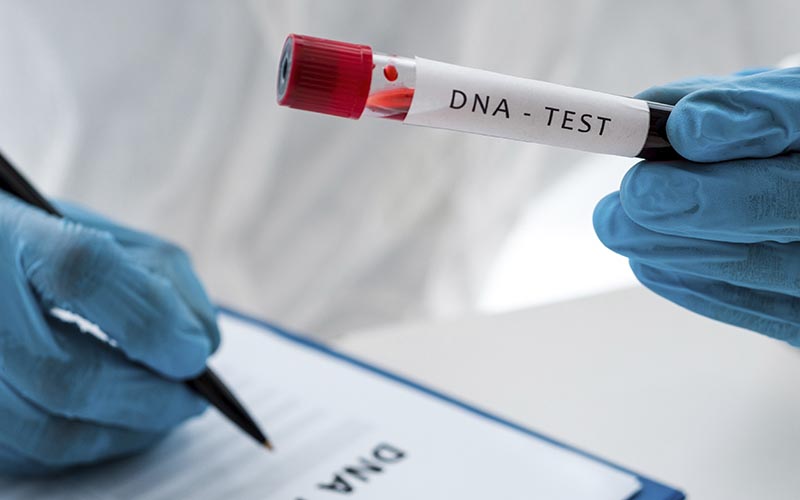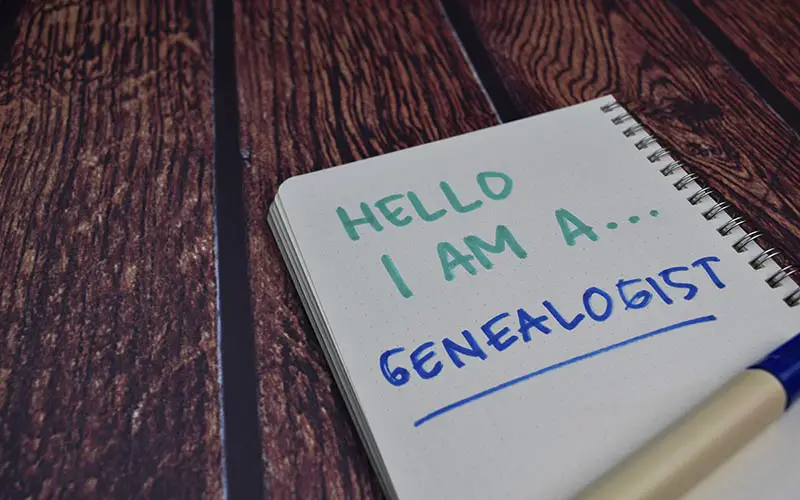Human beings have been obsessed with learning since the very beginning. We love to learn about everything.
One of the biggest questions we ask, and one that we’ve yet to answer, is why are we here?
We’re insanely curious about the mechanics of our own making, which has led to the development of genetic genealogy.
Genetic genealogy is the use of biological information to track family history through time. It’s grown in popularity in recent years due to advances in technology and availability and can be an extremely rewarding career if you know where to start and what to expect.
To help you get started in this fascinating field, we’ve compiled the best information and resources here into one complete guide to learning genetic genealogy.
Contents
What is Genetic Genealogy?
It’s interesting to note that the term “genetic genealogy” comes from two ideas in different schools of learning.
Genealogy has its roots in historical research while genetics is based in scientific research.
Their connection shows that there is plenty of overlap between the fields, even if it isn’t immediately obvious.
It also shows how wonderful cross-referencing can be, and how much advancement can be made when different fields cooperate.
To understand what genetic genealogy is, you need to understand what the two halves of the name mean and how they interact with each other.
What is Genealogy?

Genealogy is the study of family history and the origins of a particular line traced through cultural tradition, lineage, and descendants.
Its closely connected to anthropology, which is the study of human culture and its development through time.
The goal of genealogy is to establish what’s known as a pedigree, which means having a solid line of evidence that connects one generation to the next across several lifetimes, stretching as far back as possible.
This is helpful when establishing the identities of historical remains, such as with royal lines, as well as with understanding personal family histories.
The study of genealogy changes across cultures.
In many, family lines are traced through the men (patrilineal), but some cultures trace their history through the women (matrilineal).
Either method can make it difficult to obtain information if you have only one parent or ancestor to work with.
It’s a field that dives into how and why we keep family records over time, and seeks to establish those records into useable databases.
What are Genetics?
Then there’s the “genetic” part of genetic genealogy.
You’ve probably heard this term in a science class before, or when asked by your doctor if there are any conditions that run in your family.
Genetics is the study of how offspring inherit traits from their parents.
Genetics in humans starts with the smallest parts of what makes us, us.
Human beings’ most basic building block is DNA, which contains all of the information needed to assemble the cells that make up all the cells in the human body.
The DNA in every human who has ever lived is 99% identical, but that 1% variation is what makes everyone look, grow, and act differently.
The 1% variation occurs in the four alleles, or individual nucleobases in the DNA.
These miniscule changes between alleles can be tracked from parent to child over generations, dating back as far as we’ve got material to test.
How Genetics Influence Genealogy
Taking that into account, genetic genealogy is the application of genetic identification and tracing techniques to study biological family lines.
The earliest use of the combined term, according to the ISOGG, was in 1989 by Tom Siegfried.
He wrote an article in the Dallas Morning News called “Genetic genealogy and the search for ‘Eve’,” in which he talked about the oldest common ancestor known at the time.
Genealogy formerly relied completely on written records, which made establishing family lines for people whose records were lost or damaged extremely difficult, and in many cases, impossible.
With the introduction of genetics, researchers have been able to connect the dots more easily than ever before.
How is Genetic Genealogy Used?

Genetic genealogy is helpful for a huge number of reasons.
- It lets researchers verify previous findings and breakthroughs.
- It helps establish a concrete connection between similar surnames.
- It expands our understanding of inheritance and ancestry.
- It allows us to connect previously unrelated histories from around the world.
- It lets us track migratory patterns of ancient peoples, cultural association across continents, and the royal lines of countries that intermingled for generations before becoming isolated or lost.
It also lets us find individual family lines that we otherwise wouldn’t have known about.
By tracing personal genetics, we can connect those who were adopted, abandoned, or otherwise separated from their birth families with their relatives even without direct physical records, which, before the age of genetic identification, wouldn’t have been possible.
Genetic genealogy has let us identify the illegitimate children of royalty, the kings (and queens) of Ancient Egypt, the bodies of the infamous Romanov family, the living relative of the oldest human remains in Britain, and the purpose of the Y chromosome.
It’s made it possible to map the entire human genome, and made for massive advancements in both history and science.
In a more immediate sense, genetic genealogy can be used to track medical histories in a family line and assess the risk of a person for several inherited diseases.
It helps understand what causes these conditions, and to establish what the risk is that these conditions will be passed on to any children a person might have.
The Limits of Genetic Genealogy

Of course, no field is perfect.
Like anything else, genetic genealogy has its limits and drawbacks.
The first is that the field is extremely new, which means that it’s harder to access the majority of available data on a wide, public scale.
Genetic testing requires advanced scientific equipment unavailable to most people, meaning that access to direct study is very limited.
If you want to be tested, you have to go through a third party rather than doing it yourself.
The testing is also difficult to check for quality because of its youth.
This leads to the next drawback, which is cost.
The equipment used is expensive because of its specialty, and the limited availability means that those who own the appropriate equipment have near-complete control over the cost of testing.
Kits for DNA testing are currently expensive to buy, which can, again, make it hard to access.
Finally, there’s a huge question as to the ethics of genetic genealogy.
There may be relatives who do not wish to be found or whose information was taken without proper consent.
Companies may use information gathered during the testing process for unethical means such as selling to advertisers without the appropriate disclosures.
In an age where every piece of information is an integral part of your legal identity, putting together massive databases poses a huge security risk.
Luckily, there are already boards of people working together to ensure a level of regulation and ethical monitoring of the process.
How Much Do Genetic Genealogists Make?
While it isn’t the most common job in the world, professional genetic genealogists are becoming more and more in demand as people become more interested in finding out who they are and where they come from.
It’s a well-paid career.
According to Pay Scale, a full-time genetic genealogist can make between $51,000 and $87,000 per year.
They average at around $19 per hour, although since most genetic genealogists are independent contractors, this can vary depending on a person’s skill level and experience in the field.
Genetic genealogists also have interesting and varied career focuses.
Some specialize in the collection and recording of DNA sequencing.
Some are forensic genetic genealogists, connecting deceased individuals with the nearest living relatives for crime cases.
Some do research for historical purposes, tracing important family lines, while others study scientific history and how humans as a whole developed.
Genetic genealogy is a huge and varied field. So how do you get started?
Becoming a Professional Genetic Genealogist

Because it is such an unusual career, there isn’t one direct path to becoming a professional genetic genealogist.
Instead, there are a number of things to consider and build on throughout your career.
- Know that it can be a demanding and invested job. Genetic genealogy is constantly shifting and evolving as we learn more about DNA, so you must be committed to learning throughout your life and adapting your views as new information comes to light.
- You’ll need to keep connected with other professionals in the field to be up-to-date on new information as it arises. This means joining established groups and building your network, which can give you more access to databases of information that will help you in your career. These can be as simple as social media groups (such as on Facebook) or industry-led associations that require proof of credibility.
- It can be quite an emotional job as well; you will be helping people discover family that they never knew they had, including facts they may not want to know. You have to be prepared to set boundaries and understand your limits.
- You also need a host of skills that aren’t directly related to genetic genealogy. You need to have business skills, including financial and time management to appropriately charge and estimate for your clients, as well as to have the time and energy to do the job properly. You’ll also need to be an excellent communicator willing to work with a wide variety of people, and capable of creating clear, understandable written reports.
For more information on what it takes to become a professional genetic genealogist, you can visit the National Genealogical Society and the Board of Certification for Genealogists.
How to Get Started in Genetic Genealogy
If genetic genealogy sounds interesting to you, then it might be worth looking into, even on a personal level.
There’s a lot to gain from understanding genetic genealogy and the good news is that it’s relatively easy to get started.
Learning Resources
In the wonderful information age of the internet, there are hundreds of resources available to beginner genetic genealogists.
Filtering through them can be taxing, especially if you aren’t sure where to start, so here are a few trusted resources to begin with.
- The University of Utah offers a free curriculum that covers the basics of genetics and molecular genealogy in two video lesson series.
- There are many resources designed for the home genealogist available from the New York Genealogical and Biographical Society, including webinars, videos, forums, and publications from the New York Researcher.
- The International Society of Genetic Genealogy has a wonderful wiki full of all kinds of information, including a list of resources for beginners.
While there is no directly necessary college degree for a genetic genealogist, there are a number of programs that can be extremely helpful if you’re looking to add formal schooling to your list of qualifications.
Exploring at least a bachelor’s degree in family history, anthropology, history, and, of course, genealogy is an excellent idea.
You should also consider a biomedical or genetics major.
The best solution would be to have both a major and a minor, one each in the genealogical and genetic aspects of the career.
Which one is more prominent is up to personal preference.
There are also a wide number of certificates you can earn, many of which can be obtained online for a more flexible learning schedule.
Additionally, you might choose to attend various industry conferences and seminars to both learn and network with other professionals.
Research Your Own Family Through At-Home DNA Testing
The best place to start with genetic genealogy might be to do research on yourself and your own family line.
There are a lot of ways to do this, but the most popular is to get a self-testing kit online and send it in for professional evaluation.
The major sites for this are Ancestry.com and 23 and Me, although there are a few others.
These sites are wildly popular nowadays; sources report that more than 26 million people have added their DNA to the databases of these companies, letting the available matches become more and more plentiful and expanding the field significantly.
These kits cost between $50 and $200 each, depending on when and where you buy them.
Most of these sites will send you back a full report of your DNA’s construction and origin.
These reports can show you where in the world your family line is from, and often connect you with physical and digital records for your family line, including connecting your with previously unknown relations.
With that information, you can then dive into different public databases (such as the ones shared above) to find more information.
Once you’ve researched your own personal history, you can look into the history of your close family and friends and walk them through the process.
This will not only give you the research practice, but will also help you to build your communication and interpersonal skills, which, again, are a major part of professional genetic genealogy.
Monitor Your Information
As mentioned above, there are risks to diving into your family’s history.
Be careful when trusting DNA testing sites – make sure that you read the terms and conditions carefully.
While the most popular of these sites use your information purely for research purposes and building connections (the more people that use a service, the bigger the testing pool is and the more likely you are to find a match), some may not be so safe.
Understand where your information is going.
You’ll also want to look into the legal side of things.
Make sure you’re working with official, publicly available databases to keep your information accurate and safely obtained.
Be careful to respect the privacy of the individuals you connect with and don’t overstep their boundaries when it comes to researching.
As long as you’re patient and respectful, finding out more about your family and its connections to history can be excellent practice for professional work…or it can just be an interesting way to spend your time.
Genetic Genealogy is Human History
Genetic genealogy is fascinating, not just for the sheer complexity of it, but for the human aspect as well.
It’s the study of who we are at the most basic level, and how we got here.
It celebrates not just our vast and strange physical and cultural differences, but the things that are universal to being human, from our genes to our family trees.
This field takes human beings apart from the roots and delves into how we connect ourselves to each other.
It’s looking at the bricks that make up the huge structures of our society.
Genetic genealogy means learning what we’re passing to the next generation and looking at who that next generation is, guessing based on what the previous generations have been.
Diving into this field can be a fun, fascinating, and extremely rewarding decision for you and your family.
If you choose a career in genetic genealogy, or even if you just pick it up as a personal hobby, you’re choosing to be a part of the most human activity possible; you’re choosing to learn.

